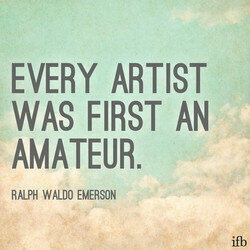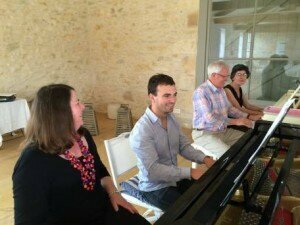 The self-help/life coaching section of my local bookshop is full of books on how to learn from the professionals – think like a pro, act like a pro, be more pro. We are encouraged to draw inspiration from successful professionals – whether they are sports people, musicians, chess players or high-flying financiers whose “pro-thinking” has made them shedloads of money.
The self-help/life coaching section of my local bookshop is full of books on how to learn from the professionals – think like a pro, act like a pro, be more pro. We are encouraged to draw inspiration from successful professionals – whether they are sports people, musicians, chess players or high-flying financiers whose “pro-thinking” has made them shedloads of money.
“Be like an amateur” – said no one ever
The word “amateur” is problematic for a start. A quick Google search throws up the following definitions:
Non-specialist, layperson, dilettante, unskillful, a hobbyist, a dabbler, inexpert, incompetent, talentless, ham-handed, unqualified……
The word “amateurish” has even worse connotations, suggesting at best a bumbling hobbyist, at worst cack-handed ineptitude.
To describe oneself as an “amateur pianist” is almost derogatory, calling to mind the image of someone fumbling through some Chopin on an out of tune upright piano.
But look more closely at the etymology of the word “amateur” and a quite different image is revealed. “Amateur” comes from the French word meaning “one who loves” and prior to the 1780s, when the word developed its more negative associations, it meant “one who cultivates and participates (in something) but does not pursue it professionally or with an eye to gain” [i.e. does not get paid for it]
Lotus Land/Cyril Scott
My primary contact with other adult amateur pianists is via the London Piano Meetup Group, which I co-founded in 2013, partly because I was keen to meet other pianists like me and because being a pianist can be a lonely activity. The members of this group display the most positive trait of amateurism: they love the piano, many with a passion bordering on obsession (myself included). They love playing the piano, talking about playing the piano, getting together at our Meetups to share the experience of playing the piano (repertoire, lessons, performing), going on piano courses to meet other lovers of the piano, and hearing others (professional and amateur) playing the piano in concert.
 It is this love which drives these people to practise, to take lessons, and to strive to improve their playing, even if they have to snatch precious moments out of their busy lives to find time to spend at the piano. Because we don’t have to earn a living by our piano playing (though a number of members of the piano group are piano or music teachers, so can be defined as “music professionals” as opposed to “professional musicians” – again, myself included), we can gain enormous pleasure from playing the piano, yet we are under no obligation to practise if we don’t want to.
It is this love which drives these people to practise, to take lessons, and to strive to improve their playing, even if they have to snatch precious moments out of their busy lives to find time to spend at the piano. Because we don’t have to earn a living by our piano playing (though a number of members of the piano group are piano or music teachers, so can be defined as “music professionals” as opposed to “professional musicians” – again, myself included), we can gain enormous pleasure from playing the piano, yet we are under no obligation to practise if we don’t want to.
In fact, all the amateur pianists I know practise regularly and happily. We all appreciate the benefits of practising and many of us cultivate our practise habits to ensure we practise productively and intelligently, no matter how much or how little time we have.
Conferring “amateur” status on someone should not be a comment on the quality of their work: some amateurs are at least as hard-working or talented as professionals – and let us not forget that in music, as in sport, everyone starts off being an amateur. A number of members of my piano group play the piano at what most people would regard as “professional” standard – they just don’t do it for a living.
When one is doing something one loves, whether playing the piano, tennis, watercolour painting or mountain-biking (my husband’s chosen passionate pursuit), we form a MEA – a Minimal Enjoyable Action – a habit which is so easy and enjoyable we do it almost intuitively, without effort and, more importantly, consistently, because we love doing it. Through regular engagement with our personal MEA, we increase our staying power, our commitment to the task, and by rewarding the brain with small successes we create a virtuous circle that can actually build greater willpower to stick to the task. (In a way, this is related to the concept of
Marginal Gain Learning, a training technique used by top athletes). Once the MEA becomes a habit, it leads to more advanced behaviours – longer, more involved practising, attempting more complex repertoire, for example. Some of us reach a plateau where we are happy in the “good enough” stage; others wish to strive further, to achieve something touching expert status by engaging in deliberate, self-regulated practise with focused goals, self-evaluation, often together with critical feedback from teachers, mentors, friends and colleagues. We know we may not touch the pros, may never perform at Wigmore Hall but we gain much pleasure from the process of being the lifelong student. We are willing to give up our time and to devote our energies freely to doing the thing we love the most because as amateurs we work on passion alone. As amateurs we can enjoy the piano and music, in its purest form, without outside interference.
So why should we embrace amateur status? Because amateurs are consistent practitioners of a healthy, passionate pursuit, practising something they enjoy which brings enormous pleasure and personal satisfaction.
More Opinion
-
 The Predictability of the 2025 Van Cliburn Competition Was Hong Kong's Aristo Sham the 'predictable winner'?
The Predictability of the 2025 Van Cliburn Competition Was Hong Kong's Aristo Sham the 'predictable winner'? -
 The Unpredictability of the 2025 Queen Elizabeth Competition Discover why these results have sparked debate among classical music fans
The Unpredictability of the 2025 Queen Elizabeth Competition Discover why these results have sparked debate among classical music fans -
 What Makes a Good Concert? A memorable concert requires four essential elements. Find out here
What Makes a Good Concert? A memorable concert requires four essential elements. Find out here -
 The Musician’s ‘Non-Negotiables’ Want to level up your music practice? Take inspiration from 'The Bear'
The Musician’s ‘Non-Negotiables’ Want to level up your music practice? Take inspiration from 'The Bear'





Well, since the definition of the word is primarily pejorative, I think the attempt to redeem it is a bit silly. Why not just go with pianist. If you want to differentiate by how much you get paid to play you could say concert pianist, professional pianist, etc. The amateur title is practically a slur. The thing that differentiates many “amateurs” from “professionals” in piano playing is mindset. A professional walks onto stage owning the identity of being a pianist and is confident. An amateur walks onto stage full of doubt and fear and plays in a way that is painful for the audience to sit through (nervous, embarrassed, awkward, pathetic). Sure, the word amateur means “lover,” and that is true of this group of people, some of whom take the practice of the instrument quite seriously; but the MEANING of the word (that is how it is UNDERSTOOD by practically EVERYONE) is novice, dabbler, inept. The word amateur wasn’t chosen by accident. It is a put down selected by the elite in the classical music world that need to create a sense of distance between themselves (the winners) and everyone else (the losers).